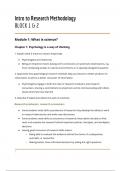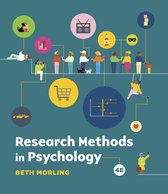Intro to Research Methodology
BLOCK 1 & 2
Module 1: What is science?
Chapter 1: Psychology is a way of thinking
1. Explain what it means to reason empirically
● Psychologists are empiricists
● Being an empiricist means basing one’s conclusions on systematic observations, e.g.
from conducting studies in natural environments or in specially designed situations
2. Appreciate how psychological research methods help you become a better producer of
information as well as a better consumer of information
● Psychologists engage in both the roles of research producers and research
consumers, sharing a commitment to empiricism and to communicating with others
about what they have learned
3. Describe 5 habits that define the work of scientists
Research producers, research consumers
● Some students need skills as producers of research; they develop the ability to work
in research laboratories and make new discoveries
● Some students need skills as consumers of research; they need to be able to find,
read, and evaluate the research behind important policies, therapies, and workplace
decisions
● Having good consumer-of-research skills means:
○ Being able to evaluate the evidence behind the claims of a salesperson,
journalist, or researcher
○ Making better, more informed decisions by asking the right questions
1
, ● Producers: researchers
● Consumers: clinical psychologists, social workers, family therapists, teachers
○ Requires knowing the research behind evidence-based treatments
How scientists work
● They act as empiricists in their investigations
● They test theories through research and revise their theories based on the resulting
data
● They follow norms in the scientific community that prioritise objectivity and fairness
● They take an empirical approach to both applied research and basic research
● Psychologists make their work public: they submit their results to journals for review
and respond to the work of other scientists
○ Another aspect of making work public involves sharing findings of
psychological research with the popular media, who may or may not get the
story right
Scientists are empiricists
● Empiricists base their conclusions on systematic, unbiased observations of the
world
● Empiricism: involves using evidence from the senses or from instruments that assist
the senses (thermometers, timers, weight scales, questionnaires) as the basis for
conclusions
● Empiricists aim to be systematic and rigorous and to make their work independently
verifiable by other observers
Scientists test theories: the theory-data cycle
● Theory-data cycle: scientists collect data to test, change, or update their theories
○ Ask a particular set of questions
○ Your theory sets you up to ask certain questions and not others
○ You make specific predictions, which you test by collecting data
○ If the data tells you your initial prediction is wrong, you use the outcome to
change your idea about the problem
2
, The cupboard theory vs. the contact comfort theory
● Cupboard theory of mother-infant attachment: a mother is valuable to a baby
mammal because she is a source of food
● The contact comfort theory (Harry Harlow; 1958): babies are attached to their
mothers because of the comfort of their warm, fuzzy fur
● To test the alternative theories, Harlow had to separate the 2 influences–food and
contact comfort by creating mothers of his own: wire mother offering food but no
comfort, cloth mother offering comfort but no food
● 3 possible outcomes - Harlow purposely created a situation that might prove his
theory wrong
● The evidence in favour of the contact comfort theory was overwhelming
○ Monkeys would cling to the cloth mother for 12-18 hours a day
Theory, hypothesis, and data
Theory: set of statements that describes general principles about how variables relate to
one another
Hypothesis/prediction: the specific outcome the researcher will observe in a study if the
theory is accurate, stated in terms of the study design
● One theory can lead to a large number of hypotheses because a single study is not
sufficient to test the entire theory
● Ideally pre-registered: after the study is designed but before collecting any data, the
researcher states publicly what the study’s outcome is expected to be
Data: set of observations which may either support or challenge the theory
● Depending on whether the data are consistent with hypotheses based on a theory,
the data may either support or challenge the theory
● Data that match the theory’s hypotheses strengthen the researcher’s confidence in
the theory
● When the data do not match the theory’s hypotheses, those results indicate that the
theory needs to be revised or the research design needs to be improved
3






